


Winning starts with what you know
The new version 18 offers completely new possibilities for chess training and analysis: playing style analysis, search for strategic themes, access to 6 billion Lichess games, player preparation by matching Lichess games, download Chess.com games with built-in API, built-in cloud engine and much more.
Interview Transcript
Location: Chennai
Date: 26th December, 2008.
Interviewers: Sriram Srinivasan and Jaideep Unudurti (Outlook
Business)
Moving onto the World Championship in Bonn: Game three was the epic encounter of the match. You missed a mate in three. Did you see it immediately after playing Bh3? Or did someone tell you after the game?
No they didn’t tell me after the game, they told me after the match! They said: now we will break it to you. It is funny. They had two misses. One was Bf5 takes d3 in Game three. The second paradoxically was Game nine where I missed a draw with Bd3 takes f5. So both the moves I missed in the match involved a bishop going between d3 and f5. With black it was in this direction, and with white the opposite. A nice coincidence. They didn’t tell me (during the match) because, I had won anyway, so they didn’t feel the need to tell. And because I won I didn’t look at the game any further. We looked at the opening, but I thought sitting and enjoying yourself like this should be kept for later.
Game three: Kramnik,V (2772) - Anand,V (2783) [D49]
WCh Bonn GER (3), 17.10.2008
1.d4 d5 2.c4 c6 3.Nf3 Nf6 4.Nc3 e6 5.e3 Nbd7 6.Bd3 dxc4 7.Bxc4 b5 8.Bd3
a6 9.e4 c5 10.e5 cxd4 11.Nxb5 axb5 12.exf6 gxf6 13.0-0 Qb6 14.Qe2 Bb7 15.Bxb5
Bd6 16.Rd1 Rg8 17.g3 Rg4 18.Bf4 Bxf4 19.Nxd4 h5 20.Nxe6 fxe6 21.Rxd7 Kf8 22.Qd3
Rg7 23.Rxg7 Kxg7 24.gxf4 Rd8 25.Qe2 Kh6 26.Kf1 Rg8 27.a4 Bg2+ 28.Ke1 Bh3 29.Ra3
Rg1+ 30.Kd2 Qd4+ 31.Kc2 Bg4 32.f3 Bf5+ 33.Bd3?? A blunder that allows
forced mate.
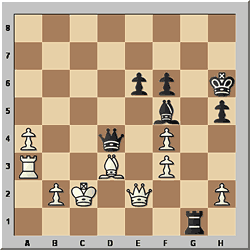
Here Anand played 33...Bh3 instead of ending it all immediately with 33...Bxd3+ 34.Rxd3 Qc4+ 35.Rc3 (35.Kd2 Qc1#) 35...Qxe2+ and Black is a queen up and can force mate in a few more moves. Anand went on to win anyway: 34.a5 Rg2 35.a6 Rxe2+ 36.Bxe2 Bf5+ 37.Kb3 Qe3+ 38.Ka2 Qxe2 39.a7 Qc4+ 40.Ka1 Qf1+ 41.Ka2 Bb1+ 0-1. Click here to replay this game with annotations.
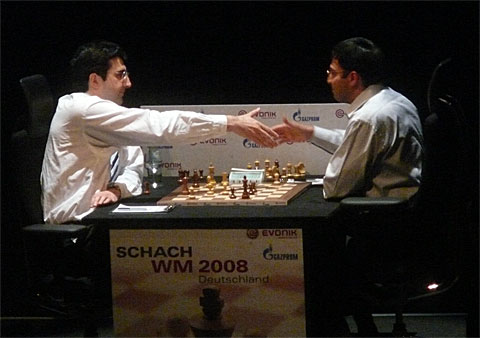
Game three: after 41 moves Kramnik sticks out his hand in resignation
Game nine: Anand,V (2783) - Kramnik,V (2772) [D43]
WCh Bonn GER (9), 26.10.2008
1.d4 d5 2.c4 e6 3.Nf3 Nf6 4.Nc3 c6 5.Bg5 h6 6.Bh4 dxc4 7.e4 g5 8.Bg3
b5 9.Be2 Bb7 10.Qc2 Nbd7 11.Rd1 Bb4 12.Ne5 Qe7 13.0-0 Nxe5 14.Bxe5 0-0 15.Bxf6
Qxf6 16.f4 Qg7 17.e5 c5 18.Nxb5 cxd4 19.Qxc4 a5 20.Kh1 Rac8 21.Qxd4 gxf4 22.Bf3
Ba6 23.a4 Rc5 24.Qxf4 Rxe5 25.b3 Bxb5 26.axb5 Rxb5 27.Be4 Bc3 28.Bc2 Be5 29.Qf2
Bb8 30.Qf3 Rc5 31.Bd3 Rc3 32.g3 Kh8 33.Qb7 f5 34.Qb6 Qe5

Here 35.Bxf5 exf5 36.Rfe1 Qg7 37.Re6 Bc7 38.Rxh6+ Kg8 39.Qe6+ Qf7 40.Rg6+ Kh8 41.Rh6+ holds a draw, but Anand took a more dangerous path: 35.Qb7 Qc7 36.Qxc7 Bxc7 37.Bc4 Re8 38.Rd7 a4 39.Rxc7 axb3 40.Rf2 Rb8 41.Rb2 h5 42.Kg2 h4 43.Rc6 hxg3 44.hxg3 Rg8 45.Rxe6 Rxc4 ½-½. Click here to replay this game with annotations.

Game nine, after 41.Rb2: Kramnik knows he has blown his winning chances

Anand has left the stage, Kramnik can suffer alone

He tries 41...h5 42.Kg2 h4 43.Rc6 hxg3 44.hxg3 Rg8

Anand plays 45...Rxe6

Kramnik plays 45...Rxc4 and a draw is agreed
In Game two you had better position but went for a draw because of time trouble. Was that a new experience, playing under time pressure?
Not really, I was in time pressure in Game three as well, but I have been in time pressure quite often recently. Still far less than others, but for me often enough. I’ll put it this way. Game two I think I spoiled it anyway. His knight has already come to d4, my bishops are sort of plodding in the side. I don’t feel I’m really better anymore. Maybe if I had an hour I could give it a shot, but under the circumstances I decided to take his draw offer. Also it is funny, I needed two minutes to decide whether I was still better, and then I had only two minutes left so it was a good decision.
The biggest bombshell in the match was you playing 1.d4. You have been a life-long e4 player. Switching to d4, they say that it requires a certain “feel” for the positions, an intuitive understanding. You don’t have that much experience in playing d4, so did you worry about that?
It was a problem and I went into it with quite some trepidation. You have a feeling that you may make a complete fool of yourself. Every game you will play, you’ll play your preparation and then in the middle-game because of unfamiliarity with certain structures you will make errors of judgement. That fear was in the back of my head. Last November I decided to play d4 and not to revisit this decision. I’m going to play it, I decided, and told my team now you can start working on d4, this is the stuff you have to cover and I’m not going to second-guess it. It is very easy to start second-guessing and there can be no way to finish this discussion. I’m happy I stuck with it; it went much better than I hoped for. I had no difficulties, but somewhere in the back of my head I did have this worry.
Kramnik sat down for an exam, but you had changed the syllabus?
Yes, but with one caveat. After Leko and Topalov – both played d4 against him – I did’t think Kramnik would be completely surprised if I switched. But from his play in the match I think it is clear that he had not expected me to switch completely. He expected me to play both, or he did not expect me to switch at all but prepared for the eventuality. When Leko played d4 he said he had not even given it a thought during preparation. I don’t think I could hope to catch him like that.
Game five is part of chess lore now. Something that will be discussed for years. Should he have repeated?
It is funny. Should I have repeated was the question we had. This line with
Bd6 suddenly ran into some difficulties. It is very funny, it kept breaking
down repeatedly on the rest day. Then at midnight I had something I could play,
so I went to sleep fairly calmly. In the morning when I came, they said: bad
news, it has collapsed. It kept going like this.
Then we found another solution at 10:30. My normal routine was to go to sleep
around one, sleep till about 1:30, shower and everything and then go back for
a final review at two o’clock. When I went at two the 10:30 recipe has
collapsed as well. And now they were agonising over whether they should tell
me or not. Because they felt if they didn’t tell me and I lost, I would
never forgive them. They were also afraid, does he need to know this? If there
is one bad thing it might not turn up. At 2:30, Radek told me, you know the
system with f5-f4, I’m playing Be7 and it is holding for me. Literally,
at 2:25 he told me this, and till 2:30 we looked at it. My game was at three,
so at 2:30 we have to leave. I went at 2:35 with this knowledge, okay, Be7,
Radek said he had checked it and it holds. I was so tense before this game.
Afterwards we were laughing, people asking should he have repeated, but the
question is should I have repeated as well.
In the video, you see that when you reach your hand to play Ne3 and then you pull it back to double-check, that is when he sees it. Was he overconfident? Apparently you’ve given up a pawn for nothing…
This is a difficult question to answer. If he had seen it he wouldn’t have allowed it of course. To allow it you would have to have not seen it. You never know. Whenever I play a move I think is winning or some move that is obviously winning when the position has not led to it, you are always worried that there is some obvious thing the rest of the world has seen and you can’t see. What you are really afraid of is that afterwards you will be so embarrassed. People will ask you how could you believe it he left that unattended or he gave you such a big chance. On the other hand, if you don’t find out you don’t find out (laughs). You can’t not play a move. He thought he was winning a pawn and getting into an almost winning ending. I don’t know, it was a tricky one. Certainly it was naïve to think that I would just leave that pawn. He could have played it some moves before. And then I went Rc5-c3. Given that I continued to allow this move should he still have assumed that it was probably was careless. I gave him three chances to do it. And that was careless.
Everyone thought he had seen it because he didn’t take it earlier. When he took it were you “I got you now” or was it “I can’t believe my luck”?
Exactly. I don’t know if it was on my face at that stage. “I can’t believe this is just winning.”
Game five: Kramnik,V (2772) - Anand,V (2783) [D49]
WCh Bonn GER (5), 20.10.2008
1.d4 d5 2.c4 c6 3.Nf3 Nf6 4.Nc3 e6 5.e3 Nbd7 6.Bd3 dxc4 7.Bxc4 b5 8.Bd3
a6 9.e4 c5 10.e5 cxd4 11.Nxb5 axb5 12.exf6 gxf6 13.0-0 Qb6 14.Qe2 Bb7 15.Bxb5
Rg8 16.Bf4 Bd6 17.Bg3 f5 18.Rfc1 f4 19.Bh4 Be7 20.a4 Bxh4 21.Nxh4 Ke7 22.Ra3
Rac8 23.Rxc8 Rxc8 24.Ra1 Qc5 25.Qg4 Qe5 26.Nf3 Qf6
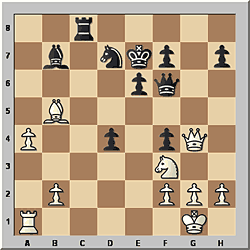
27.Re1 Rc5 28.b4 Rc3 29.Nxd4? Qxd4 30.Rd1 Nf6 31.Rxd4 Nxg4 32.Rd7+ Kf6 33.Rxb7 Rc1+ 34.Bf1
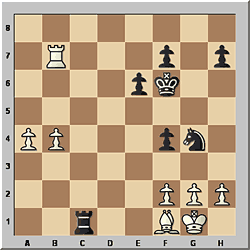
34...Ne3! 35.fxe3 fxe3 0-1. Click here to replay this game with annotations.
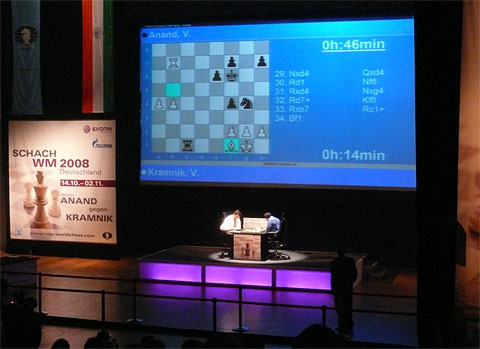
The game is almost decided, after Kramnik's 34th move
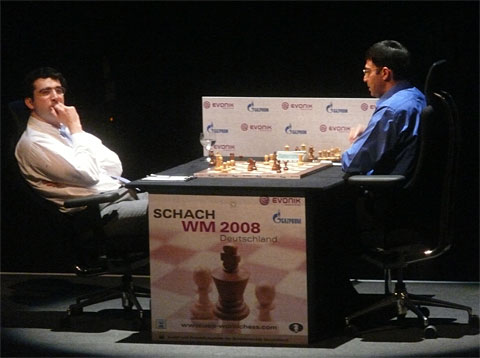
Kramnik knows it is all over, Anand watches his opponent before playing the
killer: 34...Ne3

Anand has played 34...Ne3 and left the stage, Kramnik contemplates the situation
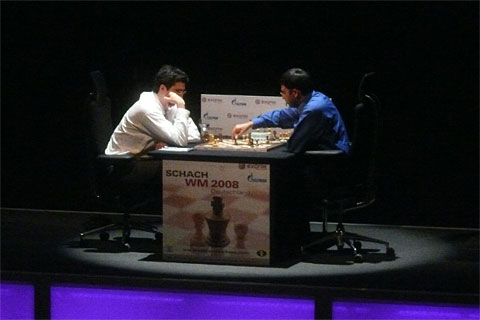
Anand plays his final move, 35...fxe3, after which Kramnik resigns
In Game six Karpov made the first move for you. And you won in a Karpovian style.
It was funny for me. I got in a good idea. Actually the move b6, Bb7 we didn’t take very seriously. We were looking at stuff that was much more direct, like Rd8. He sacced his pawn, he went c5. It wasn’t obvious to me that it was necessary, but he is worse. He is not going to get an easy draw, he is worse. When he sacced the pawn I thought, I have to make lots of embarrassing moves, come back, respond to his threats for a while, but I keep the pawn. I was a bit surprised. It slowly became evident that he had really no compensation. I have to make some accurate moves, but essentially he has no compensation. In the technical realization there were one or two small mistakes I made which crept in which he didn’t exploit. There were ones where the tactical justification was harder. In the end he made lots of obvious moves, but my responses were obvious as well. It went very smoothly. Round about the stage I go e4-e5 I just broke through.
You also got in a novelty on move nine?
Yes it is quite nice finding these moves. Again Kasimdzhanov had suggested it. We had prepared it as much for black as for white.
Was he there when you played Bb7 (in the earlier games)?
He was watching. He wasn’t in the hall. Their idea normally was to sleep when I was playing. But he said after Bb7 how can I sleep, I have to watch the rest of the game (laughs). Game three and five he didn’t sleep at all.

Uzbek GM Rustam Kasimdzhanov, a key second for Anand during the match
From Game seven it gets interesting. The tide seems to turn a little bit. Kramnik starts getting back into it. In all your post-game press conferences you were clear, I’m going to take it game by game. On the other hand you don’t have to play sharply. Was that preying on your mind?
Yes it was preying on your mind. You are influenced by the score no matter what. Game two for instance I took a draw happily when I might have been better. It turned out my judgement was okay, and I actually feel I was not better. But you don’t agonize over that decision. When you get a three-point lead, you start to agonize, “Am I becoming too passive?”, “Should I play this position on for more?” In fact in Game nine I don’t know if I was trying to convince him or me when I went Bg5-h4. From that point on nobody in my team was allowed to mention the lead and they understood this. Nobody mentioned the lead. We all pretended it didn’t exist while knowing in our minds it did. There is a conflict there. It is very difficult to play as if you don’t have a lead. You know the risks of trying to be too passive. And I knew what had happened to me in Sanghinagar.
I was about to bring that up…
"The above picture was taken during the Anand-Kamsky match in Sanghinagar. I'm the boy in the yellow shirt. Prior to the match the Sanghi group organised a series of tournaments in schools around the state, and the lucky winners received free passes to the tournament venue as well as meeting with the players. I was studying in a boarding school (Rishi Valley School) at that time so it was a terrific opportunity to go to Hyderabad, miss classes for a week and meet Anand! Vishy later went on record deploring such ceremonies in the middle of a match, though I must say in our defence that we were "lucky" for him in that he won both the days we were at the venue. When I asked him about Sanghinagar he mentioned that it was a learning experience and that is why he ensured that in Bonn he was completely free from distraction. We also met Kramnik, Gelfand, Timman and Salov by 'ambushing' them before and after games. I even managed to get Rustam Kamsky's autograph! It was a case of "I dare you" between me and a friend (who is next to me in the picture above). I approached him – at that time Kamsky's game was in the death throes and he was glued to the TV monitor muttering to Roman Dzindzindcashvilli next to him. He distractedly signed the autograph. Not so lucky was my friend who followed me moments later, Kamsky had resigned and a furious Rustam tore my friend's autograph book and hurled it in the air! Gata was a total gentleman and people told me that he played blitz with kids after the match got over. Another chucker of autograph books, but in a good way, was Boris Gelfand. We caught him just before the game and he was pumping himself up by high-fiving his seconds. When he spotted us, he snatched the autograph book and signed it with a flourish. Gelfand went on to win (it was Game four I think); interestingly all the players who took the lead in the 8-game match went on to lose. |
So it was there. It was there in the background inevitably. You could see after Game seven I was struggling a bit in the remaining part of the match.
You continued to play extremely sharply. He could have won Game 9.
He missed one winning chance. I would say the main thing was I wanted to play Bg5 before, so I felt I should play it regardless. I shouldn’t play a passive line. Inevitably if you start playing passively, negative feelings enter. Even though we were close to the end of the match, if I had drawn Game nine by being timid with white, I would still have to play Game ten. If I had lost I think I would have felt worse if I had not tried it in Game nine. Psychologically it was a good thing going for a risky line there. At any moment where in a normal game you think I’ll take this chance. When you get here you think do I need to take such a big risk? This is a conflict with yourself you keep on going through.
In Game ten, was this affecting you?
No I don’t think so. I think Re1 is simply a strong move. I couldn’t find my way around. It turns out it’s a very strong idea. It is very subtle; there are lots of hidden points. I had not managed to solve the problems on the board. That is the reason I lost. There was one moment when I got Bg4 I actually thought, “If I get to e5 and put the knight on c4 I’m pretty solid and maybe tonight I can party”. Briefly this thought entered my head, and then he went Qa6 and I understood I had basically screwed up. Then again, I would have played Bg4 even if I had thought I was not fine. I simply missed Qa6. Click here to replay game ten with annotations.
Then the amazing final game. You are a lifelong e4 player. How do you feel that e4 was finally used as a drawing weapon?
It wasn’t a drawing weapon as such. I would say in the last game I was dealing with a kamikaze. I mean a guy who could do anything because his situation was so desperate. I had prepared for all his favourite systems, but now he could do anything. He was a loose cannon. I thought it is better to be in familiar territory when he is in such a state. The idea was not to play for a draw. Of course even in a winning position, if he had offered a draw I might have taken it, but the idea was not to play for a draw. It is another thing to accept the draw when it comes, but not play for it.
The position got very wild at one stage and people wondered if you could control the complications.
For a brief moment when he went Bg7. But once I saw this manoeuvre with Qg3-f4 I knew I had probably nailed it. But I was very concentrated because it is a very sharp position. It can turn on a dime. Afterwards it turned out that White was not in any risk, but there were many lines I looked at which looked very risky to me.
At the end White was better. Any thoughts of playing on?
Not at all [with emphasis]. When he made his move Be3, the move came very slowly, so my heart rate started to go up. Then he offered the draw. For dignity’s sake I held my hand back for one second (laughs). Click here to replay game ten with annotations.

Glasses clink and champagne is sipped: That evening Anand and his team celebrate
victory
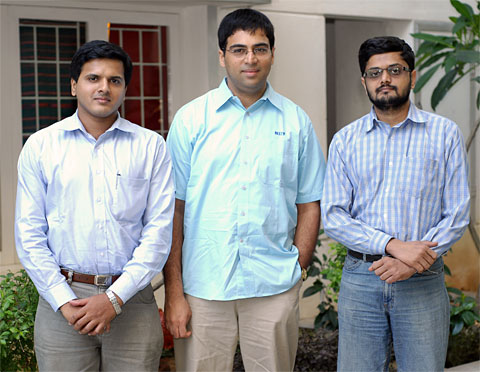
Sriram Srinivasan, Viswanathan Anand and Jaideep Unudurti at the time of
the interview

The first DVD with videos from Anand's chess career reflects the very beginning of that career and goes as far as 1999. It starts with his memories of how he first learned chess and shows his first great games (including those from the 1984 World Championship for juniors). The high point of his early developmental phase was the winning of the 1987 WCh for juniors. After that, things continue in quick succession: the first victories over Kasparov, World Championship candidate in both the FIDE and PCA cycles, and the high point of the World Championship match against Kasparov in 1995. 3:48 hours playing time.
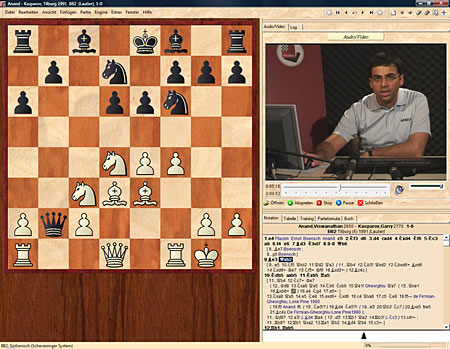
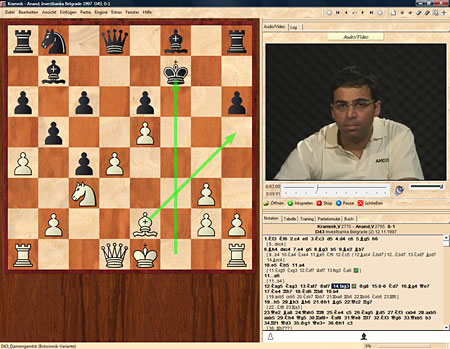
The second DVD begins in 2000, when Anand became FIDE World Champion, and it ends with his victory in the 2007 World Championship in Mexico. Anand not only analyses his best games, but casts a look back at the World Championship in Delhi/Teheran in 2000 and the years before, he discusses the situation in the Bundesliga and Kasparov's retirement from tournament chess. 4:28 hours playing time.
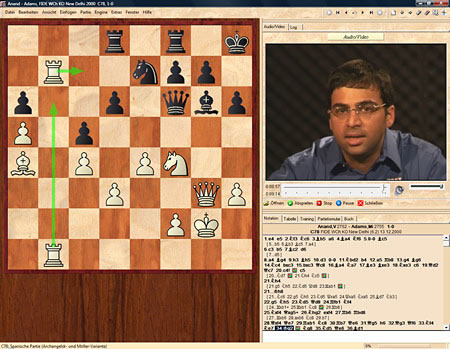
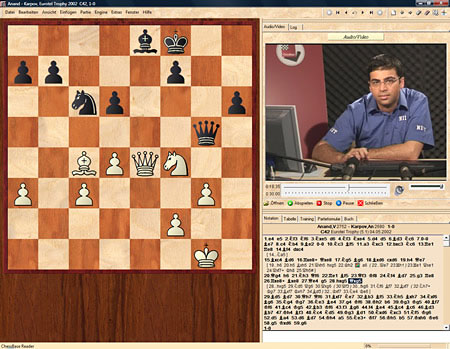
System requirements: PC, Windows Vista or XP (SP2), DVD-ROM drive, sound card.
| 32,90 | € incl. VAT |
| 27,65 | € without VAT (for Customers outside the European Union) |
| 42,85 | US $ (without VAT) |